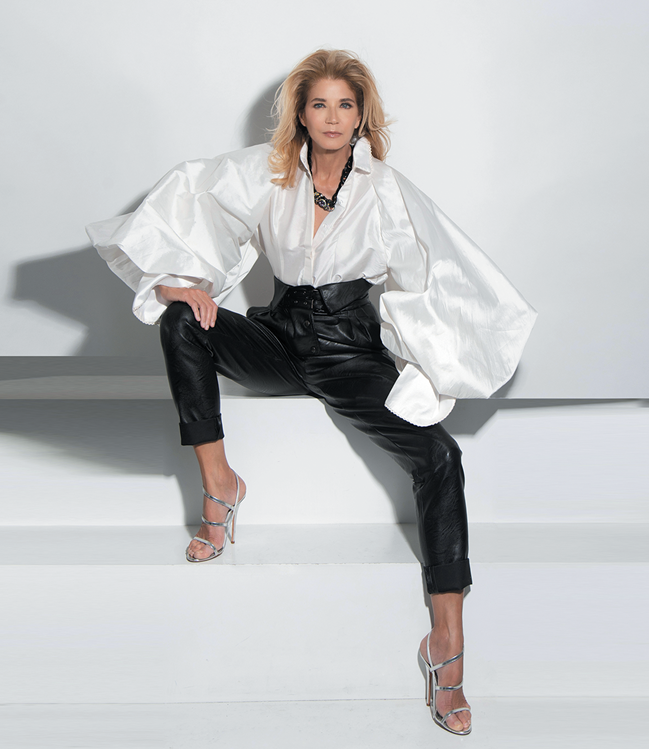- Home
- Media Kit
- MediaJet
- Current Issue
- Past Issues
- Ad Specs-Submission
- Reprints (PDF)
- Photo Specifications (PDF)
- Contact Us
- PRIVACY POLICY
- TERMS OF USE
![]()
ONLINE
![]()
ONLINE


Candace Bushnell
A Conversation with
Candace Bushnell
EDITORS’ NOTE
Candace Bushnell is the critically acclaimed, international best-selling author of Killing Monica, Sex and the City, Summer and the City, The Carrie Diaries, One Fifth Avenue, Lipstick Jungle, Trading Up, and Four Blondes. Sex and the City, published in 1996, was the basis for the HBO hit series and two subsequent blockbuster movies. Lipstick Jungle became a popular television series on NBC, as did The Carrie Diaries on the CW. From Sex and the City through eight successive novels, Bushnell has revealed a gift for tapping into the zeitgeist of any New York minute. Bushnell grew up in Glastonbury, Connecticut, and moved to New York City at age 19. She attended Rice University and New York University, and began her professional career at 19 when she wrote a children’s book for Simon & Schuster. Throughout her twenties, Bushnell developed her trademark style as a freelancer, writing about women, relationships and dating for Mademoiselle, Self Magazine, and Esquire. In 1990, she wrote a column that would become a precursor for Sex and the City, called The Human Cartoon, a fictional serial published in Hamptons Magazine. She began writing for the New York Observer in 1993; in November of 1994, she created the column Sex and the City, which ran in the New York Observer for two years. The column was bought as a book in 1995, and sold to HBO as a series in 1996. Bushnell hosted a radio show on Sirius Satellite Radio, called Sex, Success, and Sensibility, which aired from October 2006 to October 2008. She wrote and created a web series, The Broadroom, starring Jennie Garth, which launched in September 2009. Through her books and television series, Bushnell’s work has influenced and defined two generations of women. She is the winner of the 2006 Matrix Award for books, and a recipient of the Albert Einstein Spirit of Achievement Award.
Will you discuss your career journey?
When I started writing Sex and the City, I had already been writing professionally for 15 years. I first started writing and being published when I was 19 years old, and was writing for women’s magazines always trying to get a column. I wrote pieces that were really the same as Sex in the City – it was ostensibly journalism, but it was really fiction. I developed this style of writing about people in New York – money, power, sex, and women. When you wrote for women’s magazines, nobody took you seriously. I also wrote for the New York Observer which had a male audience and my work was suddenly deemed more important, even though it was no different from what I was writing for the women’s magazines. I developed a comedic voice over years and years of writing, not having any money and struggling in the early days, but was able to make a very modest living – enough to cover the rent and a couple of pairs of shoes.
My work in the New York Observer got me noticed, and I started getting calls from Hollywood. HBO was interested, ABC was interested, three movie companies were interested. At this time, I was also writing for Vogue and I met Darren Star, and we happened to have the same agent. They said that Darren wanted to buy Sex and the City, which he did, and this was a great fit since he is a great showrunner. HBO and ABC were still interested, and he ended up going with HBO.
When did you know that Sex and the City was something special?
When I got the column in the New York Observer, I knew it was my big break because at that time it was the hottest publication. I knew it was a big opportunity for me, and everyone read the column which is what led to it being sold to television.
What interested you in doing your one-woman show, “True Tales of Sex, Success and Sex and the City”?
It was an opportunity that came up. It is the origin story of how I created Sex and the City, why I invented Carrie Bradshaw, and all of the things that happened to me afterwards. Women seem to love the show and find it very inspiring. My goal is to shake up the whole relationship dynamic between men and women. I think that women should be making the money – I say to women, “Be your own Mr. Big.” I think that the dynamic is starting to change, and this is the first time I am seeing women question heterosexual relationships which, in general, don’t work for women.
It is about disrupting heterosexual relationships, and disrupting men’s expectations of these relationships. Women have changed, and men haven’t changed – there is still a huge amount of sexism. Women feel that they are ignored and that their needs aren’t met. In many of these relationships, the woman ends up giving up a lot, and the man gets taken care of. Marriage is very good for men, not that great for women. I am not saying it can’t work, and it does work if you have the right people, but I feel strongly that the dynamic needs to change.![]()